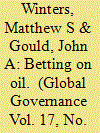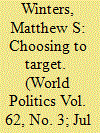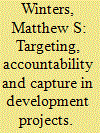|
|
|
Sort Order |
|
|
|
Items / Page
|
|
|
|
|
|
|
| Srl | Item |
| 1 |
ID:
096572


|
|
|
|
|
| Publication |
2010.
|
| Summary/Abstract |
Foreign aid involves a chain of accountability relationships stretching from international donors through national governments and implementing agencies to a set of ultimate end users of the goods and services financed by the aid. In this paper, I review five different accountability relationships that exist in foreign aid projects among donors, governments, implementing agencies and end users. Then I summarize existing empirical evidence demonstrating that foreign aid functions better-both at the macro-level of aid flows and at the micro-level of individual aid projects-when there is more government and implementing agency accountability. Specifying several mechanisms that facilitate accountability, I emphasize that participation is a tool often used to produce accountability within aid projects. However, in terms of donor accountability to aid-receiving countries and the end users in them, recent pushes for increased participation have not resulted in more accountability in the design of aid programs. Ultimately, although enthusiasm for participatory models of aid design and delivery is warranted, participation is not a panacea for all the accountability problems in foreign aid programs.
|
|
|
|
|
|
|
|
|
|
|
|
|
|
|
|
| 2 |
ID:
104443


|
|
|
|
|
| Publication |
2011.
|
| Summary/Abstract |
Can international donors ensure that poor countries spend their natural resource revenues on development? This article reviews the Chad-Cameroon Oil Pipeline Project and the World Bank's fourteen-year effort to foster pro-poor expenditure of resource revenues in Chad. The World Bank used its leverage as a gatekeeper of private sector oil investment to write fiscal restrictions and extragovernmental oversight into Chadian law. These efforts, however, were not sufficient to overcome the country's poor governance and weak political accountability. The article argues that external donor efforts to build better governance in undemocratic states are unlikely to overcome resource curse and obsolescing bargain dynamics. They may even do more harm than good. The article recommends that the World Bank implement the 2003 Extractive Industry Review suggestion to cease investing in oil production. If the Bank does continue to lend to countries like Chad, it must ensure that it retains leverage across the life of the project in order to achieve its goals.
|
|
|
|
|
|
|
|
|
|
|
|
|
|
|
|
| 3 |
ID:
097903


|
|
|
|
|
| Publication |
2010.
|
| Summary/Abstract |
Well-governed countries are more likely to make use of foreign aid for the purposes of economic development and poverty alleviation. Therefore, if aid agencies are providing funds for the sake of development, these countries should receive more aid and categorically different types of aid as compared with poorly governed countries. In poorly governed countries aid should be given in forms that allow for less discretion. Using an original data set of all World Bank projects from 1996 to 2002, the author distinguishes programmatic projects from investment projects and national from subnational investment projects. If the World Bank allows more discretion in well-governed countries, then it will choose to provide programmatic and national aid for these recipients. The author presents evidence that the World Bank provides a larger proportion of national investment lending in better-governed countries. With regard to programmatic lending, he finds find mixed evidence. Among counties eligible for International Development Association (ida) aid, good governance surprisingly is associated with a lower proportion of programmatic aid, whereas for International Bank for Reconstruction and Development (ibrd) borrowers, good governance is associated with a higher proportion. The author subjects these results to a number of robustness checks. Although he confirms the existing result in the literature that the World Bank provides larger overall amounts of aid to better-governed countries, his examination of the disaggregated data leads to questioning whether both lending wings of the World Bank are designing aid programs in the most prodevelopment way possible.
|
|
|
|
|
|
|
|
|
|
|
|
|
|
|
|
| 4 |
ID:
133654


|
|
|
|
|
| Publication |
2014.
|
| Summary/Abstract |
If development projects are to be effective, a minimum requirement is that the funding reaches its intended destination. Yet the history of international development is replete with examples of this not happening. I argue that there will be fewer problems with corruption or other diversions of funding-which I jointly label capture-in more precisely targeted projects. More well-defined targeting results in superior accountability relationships because there is greater clarity of responsibility, clearer information about outcomes, and improved identifiability of stakeholders. I use an original cross-country, cross-project data set on the incidence of capture in World Bank-funded investment projects to test the theory. The data show a negative relationship between targeting and capture, and I demonstrate that this relationship is robust to a variety of specifications. In addition, I find that there is a higher baseline likelihood of project capture in countries perceived as more corrupt according to commonly used survey-based measures from Transparency International and the Worldwide Governance Indicators, cross-validating those measures and my own
|
|
|
|
|
|
|
|
|
|
|
|
|
|
|
|
|
|
|
|
|